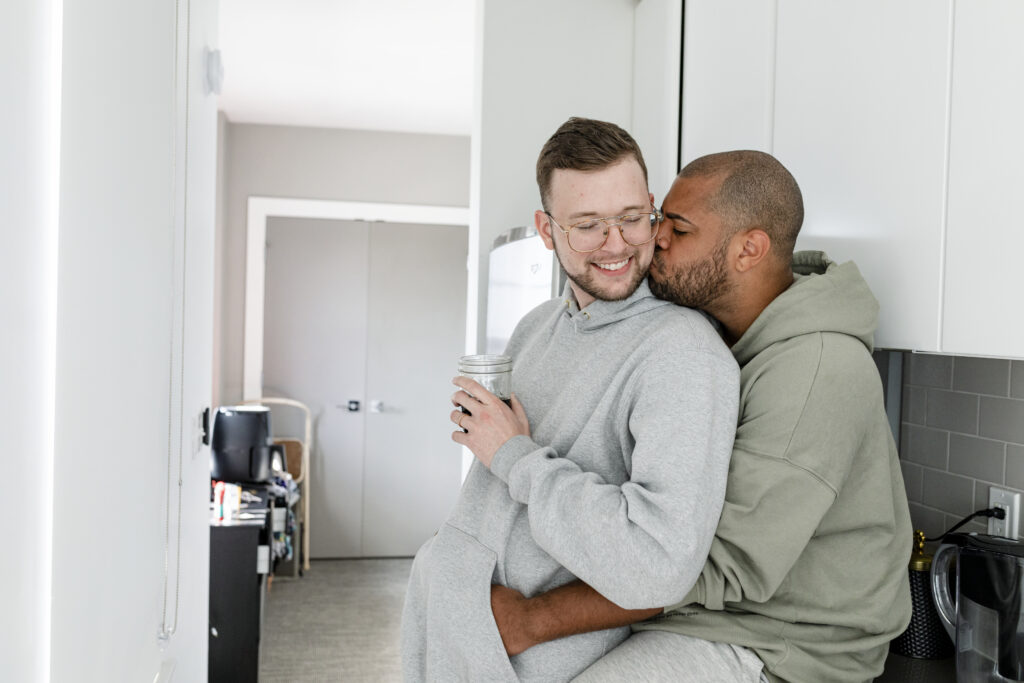How Gay Couples Can Keep Monogamy Hot? What is monogamy in an LGBTQ+ relationship? Two partners make an exclusive commitment to each other to only interact romantically and sexually with each other. Is this the right fit for your LGBTQ+ relationship? What are some of the pros and cons of monogamy for LGBTQ+ partners? Is it possible to keep the spark alive for gay couples in monogamous relationships over the long haul?
The Benefits of Monogamy in Gay Couples Include:
1. Trust and security
One of the primary advantages of monogamy is that it can promote a sense of trust and security between partners. Partners in a monogamous relationship who pledge to exclusive romantic and sexual behaviors with each other can derive safety and comfort from their relationship.
2. Emotional closeness
Monogamy between partners can also promote and deepen emotional intimacy. When you commit to one individual, you have more opportunities to build a deeper emotional connection with them, leading to a more fulfilling and satisfying relationship.
3. Advantages in terms of health
Monogamy may also have health advantages for gay couples. When partners are committed to each other and only engage in sexual activities, the risk of sexually transmitted infections (STIs) decreases significantly. Furthermore, partners may be more apt to prioritize their health and wellness when committed to each other.
4. Social approval
Monogamy is the accepted and expected norm for romantic relationships in most societies and communities worldwide. This can make it simpler for gay couples to navigate social situations and be accepted by their families and communities (though this aspect may also have some cons for partners sensitive to subjugation issues from a heteronormative majority).
5. Shared ideals
Monogamy can also allow partners to share and align their beliefs. When partners are committed to each other, they often aim for similar principles and objectives, leading to a more harmonious and fulfilling relationship.
Disadvantages of LGBTQ+ Monogamy
1. Monotony
One of the main disadvantages of monogamy is that it can lead to monotony in the sexual and emotional relationship unless both partners work hard to keep their “spark” alive. When partners are devoted to each other and only participate in sexual activities, their sexual experiences will likely be less diverse. Without much consideration and dedication, monotony can set in within the couple’s sex life, leading to boredom and dissatisfaction in the partnership.
2. Unrealistic hopes
Monogamous partners may have unrealistic standards for their relationship. For example, when both partners are committed to each other, they may expect their LGBTQ+ relationship to be perfect and without problems, placing a lot of strain on their relationship and creating unrealistic expectations that can be difficult to meet.
3. Jealousy and fear
Partners in monogamous LGBTQ+ partnerships may experience jealousy and insecurity. When partners are devoted to each other, they may become possessive and jealous of each other’s interactions with others. This can lead to tension and conflict in the partnership. However, jealousy and insecurity are most likely the results of underlying sensitivities shared by both spouses, which we refer to as schemas. Examples include abandonment, an overactive fear that your partner will ultimately leave you, and defectiveness, a belief that your partner will reject you. These insecurities are typically the root cause of insecurity, not the commitment to monogamy.
4. A lack of exploration
When LGBTQ+ partners are committed to each other exclusively, they must work harder to be thoughtful of each other so that they do not fall into the trap of less exploration and experimentation in their sexual encounters, which can lead to a shortage of variety and excitement in their relationship.
5. Limited exposure
A monogamous LGBTQ+ relationship will likely limit exposure to various individuals and experiences. When partners are committed to each other, they are less likely to engage with other people or explore different sexual adventures. Partners may limit their exposure to various perspectives and experiences, possibly a disadvantage for some people.
Is monogamy beneficial or harmful for gay couples? Unfortunately, the answer is not so simple; it truly depends on the partners in a relationship and the culture they both strive to create that fits their values and hopes for their partnership. Monogamy can enhance many benefits of an LGBTQ+ relationship, such as increased trust, emotional intimacy, and health benefits. However, it can also lead to boredom, unrealistic expectations, jealousy and insecurity, a lack of exploration, and limited exposure to various people and experiences.
The choice to enter into a monogamous relationship is personal and should be based on the needs and values of the partners involved. For example, some LGBTQ+ couples may find that monogamy best fits their relationship. In contrast, other LGBTQ+ couples may prefer to explore non-monogamous options such as open relationships or polyamory – see previous blogs for the pros and cons of each relationship structure to help decide what may make the most sense for your LGBTQ+ relationship.
Communication and mutual understanding are essential to maintaining a healthy and satisfying relationship, regardless of the relationship structure. Couples should discuss their expectations, boundaries, and desires openly and honestly and be ready to make compromises and adjustments as needed.
Monogamy isn’t the only element determining a relationship’s success. Other than compatibility, there are two other essential elements to consider regarding satisfying LGBTQ+ relationships: longevity and compatibility.

How can gaycouplestherapy.com help LGBTQ+ couples who choose monogamy to develop and deepen their relationship satisfaction?
We can help gay couples dedicated to monogamous relationships by meeting with one of our expert couples therapists specializing in LGBTQ+ couples. Relationships can be challenging sometimes; even the strongest couples can benefit from expert help. Couples therapy at gaycouplestherapy.com can be especially beneficial for gay couples in monogamous relationships, which may experience distinct challenges due to their relationship structure.
What is couples therapy?
The goals you and your partner establish during couples therapy can vary based on your needs and issues. However, some common objectives of LGBTQ+ couples therapy include the following:
• Improving partner dialogue
• Resolving disputes and disagreements
• Increasing emotional ties and intimacy
• Improving problem-solving abilities
• Increasing confidence and commitment
• Learning to handle life’s changes and challenges together
How can gaycouplestherapy.com couples therapy assist LGBTQ+ couples in a monogamous relationship?
Gay couples counseling in New York City can be especially beneficial for gay couples in monogamous relationships for a variety of reasons, including:
1. Addressing specific challenges related to gay couples
Gay couples in monogamous relationships may encounter different obstacles because of their sexual orientation, such as discrimination, stigma, and family rejection.
Couples therapy at gaycouplestherapy.com can provide a safe and supportive atmosphere for partners to discuss and work through these issues together. Our couples therapists at gaycouplestherapy.com are LGBTQ+ aware. They can help couples negotiate the complexities of being in an LGBTQ+ relationship, such as coming out to family and friends, dealing with discrimination and homophobia, and finding supportive communities.
2. Improving communication and dispute-resolution abilities
Communication and dispute resolution are essential skills in any relationship, but they can be crucial for gay partners in monogamous relationships. When partners are committed to each other and only engage in sexual activities, conflicts, and disagreements can feel more intense and challenging to manage.
Couples therapy at gaycouplestherapy.com can guide partners in communicating successfully and resolving conflicts constructively. Our couples therapists can help couples create better strategies for empathic listening, expressing needs and feelings, and negotiating constructive solutions.
3. Increasing confidence and intimacy
Trust and intimacy are essential to any healthy relationship and can be especially important for gay partners in monogamous relationships. When partners are committed to each other and only engage in sexual and romantic activities, developing and sustaining trust and intimacy can be difficult.
Couples therapy at gaycouplestherapy.com can help partners create a deeper emotional connection and trust in one another. Using emotionally focused therapy, Gottman Method Couples Therapy, and schema therapy methods, our couples therapist can lead couples through exercises and activities that promote intimacy, such as emotional check-ins, shared experiences, and physical touch.
4. Navigating non-monogamous desires
While some gay couples choose to be monogamous, others may find that non-monogamy better matches their wants and desires. Non-monogamous relationships can take many forms, such as open relationships or polyamory – see the pros and cons of each structure in previous blogs on this site.
Couples counseling can also be beneficial for couples who are considering non-monogamous relationships. Our couples therapist can help partners negotiate the complexities of non-monogamous relationships, such as increased jealousy, complicated communication issues, and hazy boundaries, using a nonjudgmental approach. Couples therapy at gaycouplestherapy.com can also help partners better grasp their desires and needs and those of their partner.
5. Developing coping strategies for stresses outside of the LGBTQ+ relationship
Outside stressors, such as job stress, financial problems, or health concerns, can strain any relationship, including monogamous gay couples. Couples therapy at gaycouplestherapy.com can assist partners in developing coping skills and strategies to better handle stressors outside of the relationship.
Our couples therapist at gaycouplestherapy.com can help couples identify the sources of stress in their lives and create coping strategies that work for both partners. Mindfulness exercises, stress-reduction techniques, or lifestyle adjustments are examples of techniques.
6. Resolving sexual problems
Sexual issues can develop in any partnership, including monogamous gay relationships. Couples therapy at gaycouplestherapy.com can help partners work through sexual and romantic problems such as differences in sexual desire, performance anxiety, or sexual health concerns.
Our couples therapists can help partners communicate their sexual needs and desires in a secure and nonjudgmental environment. Couples therapy at gaycouplestherapy.com can also provide tools and support for partners with sexual difficulties, such as referrals to medical professionals or sexual health clinics in New York City.

What can LGBTQ+ couples anticipate from couples therapy in New York City at gaycouplestherapy.com?
Couples therapy at gaycouplestherapy.com typically consists of sessions lasting from a few weeks to several months or more, based on the couple’s specific needs. During these sessions, partners will work with one of our certified therapists to address the problems and challenges in their LGBTQ+ relationship.
The couple schedules an initial session to discuss what brought them to couples therapy and share the story of their relationship, including highs and lows. Our couples therapist will typically begin by getting to know you as a couple, including your history together and your individual needs and goals. Next, both partners schedule an individual session separately for one appointment so that our couples therapist can learn about each partner’s history, including family background and early experiences in childhood and adolescence, adult romantic relationship experiences, and their narrative on their present LGBTQ+ relationship. Following that, our couples therapist will work with the couple to identify areas of conflict and patterns that have developed, including schemas and modes, or parts of each partner in the relationship, and create strategies for addressing them with both partners.
Couples therapy at gaycouplestherapy.com can include several techniques and approaches, such as cognitive-behavioral therapy (CBT), emotionally focused therapy (EFT), mindfulness-based therapy, Gottman Method Couples Therapy, and schema therapy. Our gaycouplestherapy.com couples therapist will also assign exercises and tasks for the couple to complete between sessions to improve results more quickly and increase the likelihood of changes sticking.
Throughout the couples therapy process, couples must be open and honest with each other and our couples therapists, including discussing complex or sensitive topics, such as prior traumas or future fears that may significantly impact the LGBTQ+ relationship. Our couples therapist at gaycouplestherapy.com will provide a secure and nonjudgmental environment for you and your partner or spouse to explore and work through these problems together.
Is LGBTQ+ couples therapy at gaycouplestherapy.com suitable for you and your partner?
If you and your partner are having problems in your monogamous gay relationship, couples counseling may be a good option for you. Couples therapy at gaycouplestherapy.com can provide a secure and supportive environment for you and your partner to address your concerns, improve your communication and conflict resolution skills, and develop a stronger emotional connection.
Before starting couples therapy, you and your partner should talk about committing to the process, which includes a willingness to work together to solve your problems. Additionally, it is critical to find a knowledgeable and experienced therapist in dealing with LGBTQ+ clients, such as one of our gaycouplestherapy.com couples therapists, who may be a good match for you and your partner.
Couples therapy at gaycouplestherapy.com can be a transformative experience for gay partners in monogamous relationships. Partners can manage the unique challenges of being in an LGBTQ+ relationship with the assistance of one of our experienced couples therapists. If you and your partner are interested in couples counseling, please get in touch with us to schedule an appointment. Depending on the therapist, all our sessions occur online for clients living in New York, New Jersey, or Vermont. Other states may be accessible as well, based on licensing guidelines.

Tips for gay partners in a monogamous relationship:
1. Communicate freely and honestly
Effective communication is essential in any healthy partnership, and this is especially true in monogamous LGBTQ+ relationships. Ensure you and your partner communicate your feelings, wants, and expectations openly and honestly. You can use skills such as empathic listening, expressing yourself clearly and respectfully, and being ready to compromise when required.
2. Increase confidence and intimacy
Trust and intimacy are crucial components of a healthy relationship and can be essential for monogamous gay couples. Building trust and intimacy entails being vulnerable and honest with each other, honoring each other’s limits, and being there for each other through thick and thin. Make time to connect emotionally and physically regularly, whether going on date nights, cuddling, or simply spending valuable time together.
3. Celebrate your uniqueness
Nobody is exactly alike, and that’s okay. In reality, celebrating your differences can be an excellent way to strengthen your bond and deepen your understanding of each other. Take the time to learn about each other’s interests, hobbies, and perspectives, and be willing to attempt new things together. This can help you both develop as individuals and as a couple.
4. Manage conflict
Conflict is inevitable in any romantic relationship, but it is critical to handle it effectively. This includes avoiding blame and criticism, remaining focused on the problem, and being willing to apologize when necessary. If you and your partner have difficulty resolving conflicts, consider getting the advice and support of one of our LGBTQ+ couples therapists.
5. Keep the passion alive
It’s easy to get caught up in the day-to-day demands of life and lose sight of the passion, but it’s critical to make time for each other to keep the spark alive. Examples are planning surprise date evenings, sending thoughtful texts or emails, or simply enjoying each other’s company. Romance can take many forms, but what matters is that you and your partner feel cherished and appreciated.
6. Stay engaged with the LGBTQ+ community
Being a member of the LGBTQ+ community can provide support and strength to many gay couples in monogamous relationships. Maintain your community connections in New York City by visiting events, joining social groups, or volunteering for LGBTQ+ organizations. This can help you experience both a sense of belonging and pride in your identity.
7. Take care of yourself
Taking care of yourself is an essential component of being in a healthy relationship. You should schedule time for self-care activities such as exercise, meditation, or hobbies you appreciate. It also implies being open and honest with your partner about your needs and limits and being willing to step back when you need space or alone time.
8. Be open to growth and change
As individuals and as a couple, challenge yourself and each other to be open to growth and change. For example, you may challenge yourself to attempt new things, confront difficult emotions or experiences, or be ready to adapt to changing circumstances. As you stretch yourself, your bond with your partner is growing stronger.
Being in a monogamous gay relationship can be a profoundly rewarding experience, but it is not always easy. However, by following these suggestions and being ready to put in the effort, you and your partner can create a solid and fulfilling relationship that can last a lifetime.
9. Seek professional help
If you and your partner have difficulty navigating the challenges of a monogamous relationship, don’t be afraid to seek expert help. One of our gaycouplestherapy.com couples therapists who specializes in working with LGBTQ+ couples can provide you and your partner or spouse with the support, guidance, and tools you need to strengthen your relationship and overcome any hurdles you face.
10. Exercise appreciation
Gratitude is essential to any healthy relationship and can be potent for monogamous gay partners. Take the time to express your appreciation for your partner and the positive elements of your relationship. This can make you feel more connected and valued, and it can help you weather any challenges that come your way.
11. Maintain your optimistic attitude
Keeping a healthy and happy relationship requires maintaining a positive attitude. You can concentrate on the positive aspects of your relationship and work to surmount any challenges with a positive attitude. Make a deliberate effort to cultivate positivity in your life and relationship, whether practicing gratitude, participating in uplifting activities, or simply choosing to see the best in your partner and your relationship.
12. Be patient and kind
Patience and kindness are essential qualities in any successful relationship. Remember to be patient with your partner and yourself as you negotiate your relationship’s ups and downs and treat each other with kindness and respect. You can create a secure and supportive environment for your relationship to thrive by fostering a culture of patience and kindness.
13. Maintain your dedication
Commitment is the foundation of any effective monogamous relationship. Partners are ready to work through difficulties and make sacrifices for the sake of your relationship. Even when things get complicated, stay committed to your spouse and your relationship, and remember that the effort you put in will be rewarded in the end.
Sex is essential to any romantic relationship and can be vital for gay couples in a monogamous relationship. However, while monogamy can provide security and stability, it can also offer challenges when keeping the spark alive in and out of the bedroom.

Tips and strategies for keeping your sex life fulfilling in a monogamous gay relationship:
1. Be open to new experiences with each other
One of the advantages of a monogamous partnership is that you have a partner with whom to experiment with novel sexual experiences. Be open to attempting new things in the bedroom, whether experimenting with various positions, trying out new toys, or exploring different types of role play. This can keep things interesting and exciting and help you and your partner strengthen your connection.
2. Prioritize closeness
Intimacy is more than just sex; it is about feeling near and connected to your partner. Make sure you prioritize intimacy by spending time together outside the bedroom, participating in activities you enjoy, and showing affection and gratitude for each other. This can help to lay a solid foundation for your sexual connection and make sex feel more meaningful and fulfilling.
3. Take into account your partner’s needs
It is critical to be aware of your partner’s wants and desires in any sexual relationship. First, try understanding what your partner enjoys and what they’re looking for in and out of the bedroom. Then, try to satisfy those needs and wants, helping both of you have a more satisfying sexual experience and strengthen your emotional connection.
4. Maintain physical fitness and well-being
Taking care of your physical health can positively affect your sexual relationship. For example, are you getting enough sleep, working out regularly, and eating a balanced healthy diet? Taking care of yourself physically can help you have more energy and stamina in the bedroom and feel more confident and comfortable in your flesh.
5. Take some time to unwind and de-stress
Stress and anxiety can hurt your sex life. Make it a habit to relax and de-stress regularly, whether through yoga, meditation, or a long bath. When less stressed, you’re more likely to feel more relaxed and present during sex, allowing you to appreciate the experience fully.
6. Keep the passion alive
Romance is essential to any healthy relationship and can be vital for monogamous gay couples. Plan date evenings, send sweet texts or notes, and show your partner or spouse how much you care about them to help keep your romance alive. Together you can help to develop a sense of excitement and anticipation around sex, making the experience more meaningful and fulfilling.
7. Be open to compromise
Compromise is essential to any successful relationship and is imperative for sex. But, when it comes to compromise, try to be flexible with your partner about your needs and desires.
8. Keep an open attitude
Finally, when it comes to sex, it’s crucial to maintain an open mind. Everyone has different sexual desires, preferences, and limits; what works for one couple may not work for another. Approach sex with curiosity and exploration, and be ready to try new things and move outside of your comfort zone. You can help keep your relationship new and exciting in or outside the bedroom and help you and your partner grow and evolve together.








